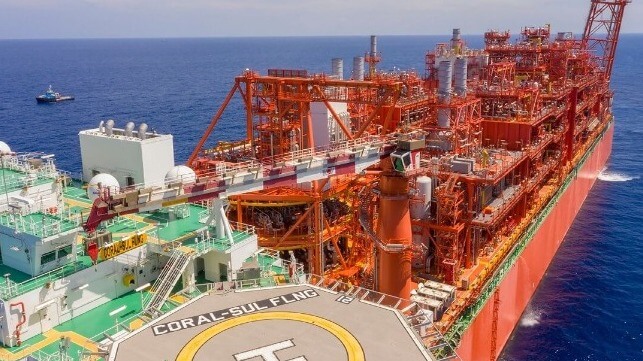Mozambique Exports its First LNG Cargo to Europe

After Russia’s war in Ukraine disrupted the global energy market, especially in Europe, new energy suppliers have steadily emerged to plug the demand gap. Particularly, African nations rich with hydrocarbons have seen intensified interest in their gas fields.
On Sunday, Mozambique flagged off its first shipment of LNG destined to Europe. This was a historic moment for the country, ending a decade-long wait to monetize Africa’s largest offshore gas fields.
The first shipment was sourced from the Coral Sul floating LNG vessel, operated by the Italian multinational energy company Eni. The FLNG, located in Rovuma Basin, off Mozambique’s coast, has a capacity of 3.4 million tons per year. It is linked to six subsea gas producing wells.
The LNG carrier British Sponsor has been loading the super-chilled gas since October 23, about two weeks after Coral Sul FLNG started gas production. The vessel is owned by BP Plc, which has rights to take the entire volume of LNG produced at the Coral Sul project under an initial 20-year contract signed with ENI and other project partners behind the Coral Sul field.
“ Today, Mozambique enters the annals of world history as one of the countries that export liquefied natural gas, which, in addition to representing an alternative source of supply, contributes greatly to the energy security of the countries with the highest consumption,” Mozambique’s President Filipe Nyusi announced in a statement on Sunday.
It is estimated that Mozambique has natural gas reserves in excess of 180 trillion cubic feet, which is enough for peak annual LNG production of as much as 30 million tonnes per year. Most of these reserves are found in the country’s northeastern region. Eni is the main operator of the Coral South Project in Area 4 of the Rovuma Basin. Other project partners in Area 4 include ExxonMobil, China’s CNPC, Portugal’s Galp, South Korea’s Kogas and Mozambique’s ENH. The Coral South Project is currently the only offshore LNG project in Mozambique.
Unfortunately, the Mozambique’s fledgling LNG industry has been held back by an Islamist insurgency, which has seriously impacted plans to build onshore LNG terminals. Last year, France’s TotalEnergies was forced to declare force majeure at its 13.1 million tonnes per year LNG project near Palma when fights in the town intensified, leaving dozens of people dead.

that matters most
Get the latest maritime news delivered to your inbox daily.
An ExxonMobil-led 15.2 million tonnes per year onshore LNG project near Palma has also stalled. Palma is around 30 miles west of port of Mocimboa da Praia, which rebels seized briefly in 2020-21.
Mozambique’s first gas shipment comes at a time when there have been reports of an LNG oversupply in some European countries. In late October, there were more than 35 LNG-laden vessels drifting off the Spanish Coast and around the Mediterranean. The vessels were unable to secure slots to unload due to LNG overcapacity at the terminals. As Europe pivots from Russia’s LNG supplies to alternative sources, its lack of infrastructure for LNG “regasification” and storage has been exposed, and it is scrambling to catch up by chartering floating storage and regasification units (FSRUs).
